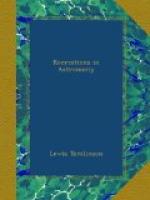[Page 179] IX.
THE NEBULAR HYPOTHESIS.
“And the earth was without form, and void; and darkness was upon the face of the deep.”—Genesis i. 2.
[Page 180]
“A
dark
Illimitable ocean, without
bound,
Without dimension, where length,
breadth, and height,
And time, and place are lost.”—MILTON.
“It is certain that matter is somehow directed, controlled, and arranged; while no material forces or properties are known to be capable of discharging such functions.”—LIONEL BEALE.
“The laws of nature do not account for their own origin.”—JOHN STUART MILL.
[Page 181] IX.
THE NEBULAR HYPOTHESIS.
The method by which the solar system came into its present form was sketched in vast outline by Moses. He gave us the fundamental idea of what is called the nebular hypothesis. Swedenborg, that prodigal dreamer of vagaries, in 1734 threw out some conjectures of the way in which the outlines were to be filled up; Buffon followed him closely in 1749; Kant sought to give it an ideal philosophical completeness; as he said, “not as the result of observation and computation,” but as evolved out of his own consciousness; and Laplace sought to settle it on a mathematical basis.
It has been modified greatly by later writers, and must receive still greater modifications before it can be accepted by the best scientists of to-day. It has been called “the grandest generalization of the human mind;” and if it shall finally be so modified as to pass from a tentative hypothesis to an accepted philosophy, declaring the modes of a divine worker rather than the necessities of blind force, it will still be worthy of that high distinction.
Let it be clearly noted that it never proposes to do more than to trace a portion of the mode of working which brought the universe from one stage to another. It only goes back to a definite point, never to absolute beginning, nor to nothingness. It takes matter from [Page 182] the hand of the unseen power behind, and merely notes the progress of its development. It finds the clay in the hands of an intelligent potter, and sees it whirl in the process of formation into a vessel. It is not in any sense necessarily atheistic, any more than it is to affirm that a tree grows by vital processes in the sun and dew, instead of being arbitrarily and instantly created. The conclusion reached depends on the spirit of the observer. Newton could say, “This most beautiful system of the sun, planets, and comets could only proceed from the counsel and dominion of an intelligent and powerful being!” Still it is well to recognize that some of its most ardent defenders have advocated it as materialistic. And Laplace said of it to Napoleon, “I have no need of the hypothesis of a god.”




